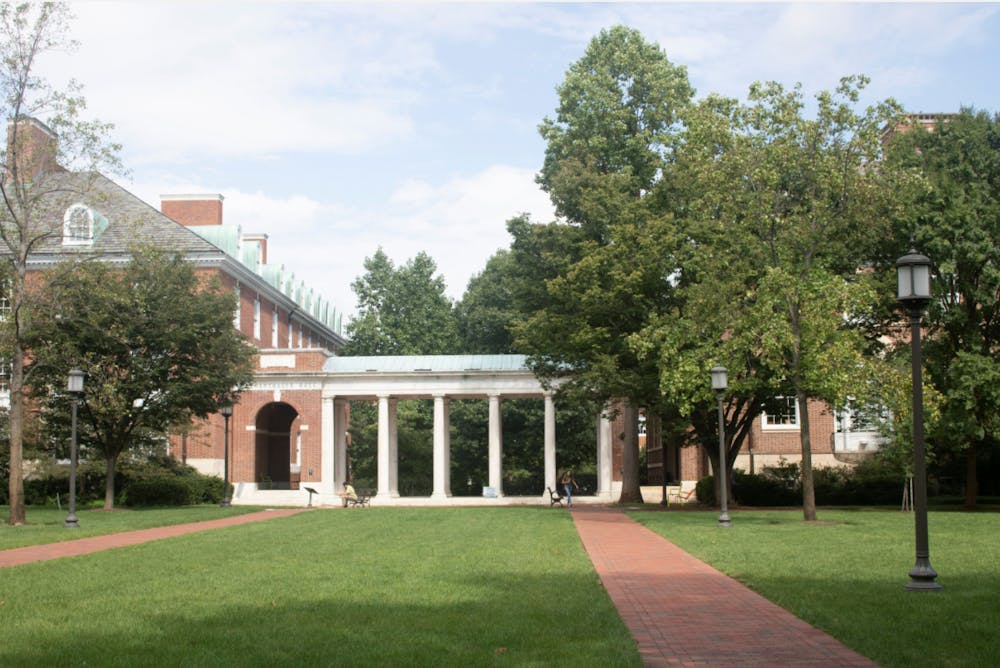The Office of Diversity and Inclusion hosted “Addressing Hate During COVID-19” on April 23 to discuss nationwide calls for racial justice. The event was sparked by the conviction of Derek Chauvin, the Minneapolis police officer charged with the murder of George Floyd last summer, and followed the fatal shooting of Daunte Wright, a 20-year-old Black man, in Brooklyn Center, Minn., on April 11.
At the event, University President Ronald J. Daniels encouraged reflection and collective action within the Hopkins community.
“I really hope that, like so many other institutions across America, we can emerge from this moment listening carefully and openly to one another to make our places better and more inclusive,” he said.
Junior Phoebe Fechtmeyer, a Minneapolis native, reacted to the continued acts of police brutality in the city in an email to The News-Letter.
“I am angry, disappointed and scared for the Minneapolis community,” she wrote.
Many students raised concerns about social progress towards criminal justice reform.
In an email to The News-Letter, junior Jevon Campbell, director of finance and internal communications for the Men of Color at Hopkins Alliance, expressed his frustration following Chauvin’s trial.
“We did not witness the dismantling of white supremacy or police brutality. We only witnessed a corrupt system sacrificing one person to keep itself alive,” he wrote. “There is no room for complacency.”
Sophomore Jayla Scott criticized Minneapolis lawmakers for their failure to adequately address police brutality since Floyd’s death last year.
“It's devastating how the same city that was up in flames last summer is up in flames again,” she said. “The people in Minneapolis have made their demands very clear, but the city isn’t listening to them. The city is still putting more money into the police department, and it's still enabling officers to take lives.”
Senior Elise Moore, co-president of the Black Student Athlete Association (BSAA) and Minneapolis native, explained her reaction to the recent acts of police brutality.
“Because I am away from home, most of my involvement has been through learning about what is out there and what people need,” she said.
Last summer, Moore created BSAA with fellow student athletes to connect Black students within the University’s athletic community. The organization has been working with Daniels to specifically list race as one of the protected categories in the current hate speech policy of the student handbook.
Scott, who has worked with coalitions to lobby against the Hopkins private police force, questioned the University’s push for the Johns Hopkins Police Department (JHPD), especially in the context of nationwide discussions about police brutality.
“Disbanding the JHPD is first in our call for action,” she said. “How can you expect people to heal when you intend to terrorize them with a police force?”
Senior Andrea Thurnheer, a Minnesota native, agreed that the University’s private police force could pose a threat to the local community.
“The private police force is very disruptive to students who feel personally attacked by it,” she said. “The University should get rid of the private police force, donate money to the community and take more action towards making marginalized groups in Baltimore and Hopkins feel more included and supported.”
In an email to The News-Letter, Karen Lancaster, the assistant vice president of external relations for the Office of Communications, explained that the University has not begun any planning for a JHPD during the two-year pause, after which they will evaluate their next steps.
She added that in the meantime, the University will invest in innovative developments for public safety such as the Innovation Fund for Community Safety, a four-year effort to fund and evaluate community-based public safety efforts.
Lancaster detailed some of the further initiatives the University is supporting.
“We are eager to work with Mayor Brandon Scott on efforts to interrupt cycles of violence in our city and are invested in Baltimore’s violence intervention programs such Safe Streets, Roca, and Baltimore’s recently announced focused deterrence initiative, a nationally-recognized and evidence-based model for crime reduction,” she wrote.
Additionally, Lancaster noted that the University will be reviewing legislative changes in the state as they pertain to plans for the JHPD.
Scott suggested that the University go a step further to give back to the Baltimore community.
“Hopkins has caused destruction all throughout Baltimore, so where are the reparations for these harms?” she said. “You can apologize, but if you're not putting your money where your mouth is, you're not really helping communities.”
Moore criticized the annual President’s Day of Service, arguing that much of its resources could be better used for the community.
“It's ridiculous how so much of funding goes to t-shirts, lunches and speeches,” she said. “We should be distributing those meals, putting that money into school funding and creating community programs.”
She recalled an op-ed she shared with The News-Letter last June.
“It's so sad that all of it is still relevant,” she said.
A list of resources for students who may need additional support due to impacts of recent incidents may be found here.
Laura Wadsten contributed reporting to this article.





